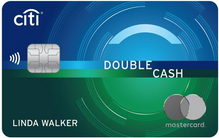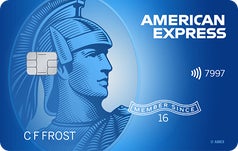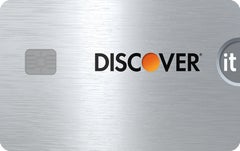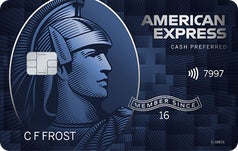Citi Double Cash® Card review: A first-class card for flat-rate cash back and balance transfers
The Double Cash is a top flat-rate card, especially if you’re consolidating debt.
The Bankrate promise
At Bankrate we strive to help you make smarter financial decisions. While we adhere to strict , this post may contain references to products from our partners. Here's an explanation for .
Snapshot
4.2
Bottom line
Best for up to 2% cash back
Intro offer
$200 cash back
Rewards rate
2% - 5%
Annual fee
$0
Regular APR
17.49% - 27.49% (Variable)
4.2
Bankrate score
Rewards value
APR
Rewards flexibility
Features
Reward Details
Card Details
Remove a card to add another to compare
Remove a card to add another to compare
Citi is an advertising partner.
Citi Double Cash® Card overview
The competition between flat-rate cash rewards cards has heated up over the past few years, and the citi Double Cash® Card has remained a top choice — especially if you’re looking to pay off credit card debt. The Citi Double Cash is a practical cash back credit card regardless of your usual spending habits, whether you’re looking for a standalone rewards card or you’re trying to level up your existing card roster.
While many flat-rate cash rewards cards earn 1.5 percent cash back on purchases, the Citi Double Cash is one of the few straightforward, 2 percent cash back cards available with no rewards spending cap (earning 1 percent back when you buy, plus 1 percent when you pay off the purchase). The Double Cash card has also carved out a name for itself in the balance transfer card market as well, thanks to its exceptionally long intro APR for a rewards card.
The competition between flat-rate cash rewards cards has heated up over the past few years, and the Citi Double Cash has remained a top choice — especially if you’re looking to pay off credit card debt. No intro APR on purchases may be a deal-breaker for some people since competitors carry more well-rounded offers, but pausing snowballing interest on their balance for an extended window may be more than worth the trade-off for many applicants.
Similarly, the Double Cash card’s rewards structure may be seen as an unnecessary speed bump for experienced cardholders, but this minor quirk can encourage rewards card newcomers and debt consolidators to regularly pay off their card on time and in full.
Citi Double Cash video review: Our editor's hot take
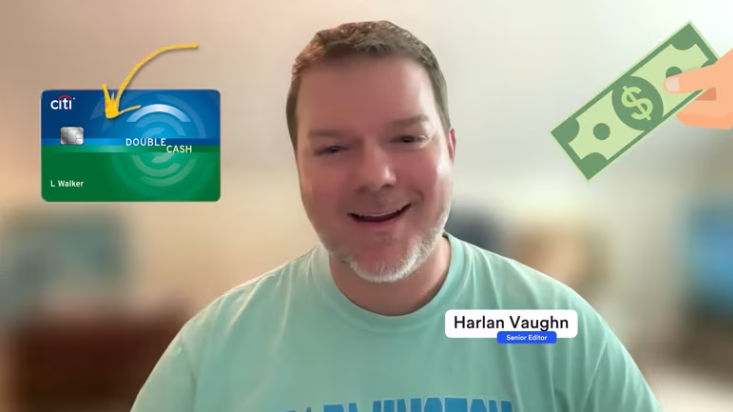
Bankrate senior editor Harlan Vaughn has a lot to say about the Citi Double Cash, including its most attractive features and even a "surprise" twist. Check out his video review.
Editorial disclosure: Opinions expressed in this video are the author's alone, and have not been reviewed or approved by any advertiser. The information, including card rates and fees, is accurate as of the publish date. All products or services are presented without warranty. Check the bank’s website for the most current information.
-
Rewards
- Up to 2 percent cash back on all eligible purchases (1 percent when you buy, plus another 1 percent when you pay off purchases)
Expert Appraisal: Good
See our expert analysis -
Welcome offer
- Earn $200 cash back after you spend $1,500 on purchases in the first six months of account opening (fulfilled as 20,000 ThankYou® Points, which can be redeemed for $200 cash back).
Expert Appraisal: Typical
See our expert analysis -
0% APR offer
- 0% intro for 18 months on Balance Transfers (transfers must be made within the first four months)
- 17.49% - 27.49% (Variable) APR
Expert Appraisal: GoodSee our expert analysis
-
Rates and fees
- No annual fee
- 3 percent foreign transaction fee
- 3 percent intro balance transfer fee ($5 minimum; 5 percent after the first four months)
Expert Appraisal: TypicalSee our expert analysis
-
Other cardholder perks
- Citi Entertainment access
- Citi Flex Pay alternative installment payment plans for qualifying cardholders
Expert Appraisal: Weak
See our expert analysis
Citi Double Cash pros and cons
Pros
-
It has one of the highest flat cash back rates available, making it an excellent standalone or complementary card.
-
This card does not charge an annual fee.
-
It features one of the longest intro APR offers for balance transfers on a rewards card.
Cons
-
You need to pay your balance to get the full rewards amount.
-
A 3 percent foreign transaction fee makes this card a poor choice for purchases abroad or from international vendors.
-
Unlike similar flat-rate cards, it doesn’t offer an introductory APR on new purchases.
How to save money with a Citi Double Cash Card balance transfer
The Double Cash's great intro APR offer and low transfer fee can potentially save you hundreds — and potentially more than rival balance transfer cards.
According to Experian, the average credit card balance is $6,730. If you transferred it to the Citi Double Cash, you could pay just over $385 a month for 18 months when you include the $202 balance transfer fee — all without accruing any new interest. Taking that same amount and timeline but applying the current average interest rate of about 20 percent, Bankrate’s credit card payoff calculator shows you’d have to $439 per month and would accrue $1173 in interest.
This could also be more cost-effective than using a card with a 21-month intro APR. Although it lower the $385 monthly payment to about $330 in this example, the additional time might not be worth the $337 cost of a typical 5 percent transfer fee when compared to $202 for the card’s intro 3 percent transfer fee.
Why you might want the Citi Double Cash
The Citi Double Cash is one of the best no-annual-fee cash back cards available. Whether you’re looking for a standalone card or want to combine it with other cards, the flat rate earned for all purchases makes it a great option. It could also be a top choice if you need to pay off debt thanks to its strong intro APR on balance transfers.
Rewards: Stellar flat cash back rate
On top of being one of the best flat-rate cash back cards on the market, the Citi Double Cash can help keep your spending habits in check with its up to 2 percent cash back structure: 1 percent cash back when you buy, plus an additional 1 percent as you pay for those purchases. If you’re new to rewards cards, this earn-as-you-pay structure can incentivize you to pay on time to avoid interest charges and the slippery slope into debt.
The Citi Double Cash is also an option if you’re looking for a low-maintenance rewards card. You’ll earn the same unlimited rewards rate on any purchase, so you won’t have to track spending categories or juggle multiple cards to maximize rewards.
Bankrate Insight
Although Citi advertises the Double Cash as a cash back card, you actually earn ThankYou points, which you can redeem on a variety of redemption options. To make the most of “basic” points, you can pool them with the points you earn from one of Citi’s premium travel cards. Based on Bankrate’s latest point valuations, this could increase the value of your points from 1 cent to around 1.6 cents each on average when you take advantage of Citi’s best travel transfer partners.
0% APR balance transfer offer: A lengthy intro APR for a cash back card
The Citi Double Cash is a great zero-interest credit card: The card’s 0 percent introductory APR on balance transfers lasts an impressive 18 months (then 17.49% - 27.49% (Variable)). That’s one of the longest offers you can find on a no-annual-fee rewards card, and it’s on par with many offers you’ll find on traditional balance transfer cards.
The 3 percent introductory fee for balance transfers ($5 minimum; 5 percent for transfers made after the first four months) is also lower than the initial 5 percent fee that some balance transfers cards typically charge.
Welcome offer: A decent bonus
The Citi Double Cash currently boasts a competitive offer of 20,000 ThankYou points after you spend $1,500 in your first six months as a cardholder (worth $200 when you redeem for cash back). This is on par with the bonus offers you'll find on many of the best no-annual-fee cash back and rewards cards, though the spending requirement is a bit high.
While a sign-up bonus shouldn’t be the main factor when weighing card options, these bonuses can offer substantial value. You’d need to spend $10,000 to earn $200 cash back with the Citi Double Cash without this welcome offer.
Why you might want a different cash back card
Although the Citi Double Cash is a top-tier option among flat-rate cards, it lacks an intro APR period for new purchases and only carries basic perks. These shortcomings may disappoint if you want more first-year value.
Rates and fees: No annual fee, but otherwise typical
The no-annual-fee Citi Double Cash should be a rewarding card but it can be hindered if you carry a balance. The foreign transaction fee and late payment fee, along with any ongoing interest accrued on carried balances, can quickly wipe out your earned rewards and then some. Out of all of these, only the 3 percent foreign transaction fee may be a deal-breaker since it can be costly and hard to avoid if you travel frequently.
You can avoid many of these other fees if you avoid paying late, especially since the Double Cash card’s rewards depend on it and you could void your intro APR offer. Missing a payment could also trigger the high penalty APR. The Double Cash card’s penalty APR is much harsher than some rival cards since Citi’s can last indefinitely. Meanwhile, several competitors don’t charge a penalty APR, and those that do will typically remove it after six to 12 months if you make consistent on-time payments.
APR Offer: No introductory offer on purchases
The Citi Double Cash doesn’t offer an intro APR on purchases, meaning any purchases you don’t pay off on time can rack up interest — which could lead to paying off a new snowballing balance in addition to your original transferred balance. This is disappointing considering how many other no-annual-fee rewards cards offer a 12- to 15-month intro APR on both purchases and balance transfers.
Perks: Limited benefits for a rewards card
The Citi Double Cash is light on card benefits compared to a few competing cash back cards, although this isn’t a significant drawback since no-annual-fee cash back cards generally don’t carry many perks outside their rewards programs and intro offers.
Like all Citi credit and debit cards, the Double Cash card comes with Citi Entertainment access. Citi Entertainment opens the door to presale tickets, events and experiences. Eligible purchases may also qualify for a Citi Flex Loan alternative payment plan. But because other issuers like Amex and Chase offer similar features, these benefits probably won’t make or break your decision.
We tried it: Here’s what our experts say
Bankrate senior credit card editor Nouri Zarrugh uses the Double Cash card to maximize rewards on purchases that don’t typically earn boosted rewards.
I love the card’s simplicity. It has come in handy for big but easy-to-forget expenses like insurance bills or car repairs, which typically only earn 1 percent back on other cards. Even though I carry several cards, I have plenty of purchases pop up for which the Double Cash offers the best return on spending.
— Nouri Zarrugh, Editor, Bankrate
How the Citi Double Cash compares to other cash back cards
The Citi Double Cash card offers one of the highest flat rewards rates upfront, but it may be easier to get a higher flat rate with a less popular card. It also lacks an intro APR on new purchases, which could make it harder to pay off your credit card debt if you have an unexpected expense.
Here are some comparable flat-rate cash back cards worth considering before committing to the Citi Double Cash.

Annual fee
Intro offer
Earn $200 cash back after you spend $1,500 on purchases in the first 6 months of account opening. This bonus offer will be fulfilled as 20,000 ThankYou® Points, which can be redeemed for $200 cash back.
Rewards rate
Earn 2% on every purchase with unlimited 1% cash back when you buy, plus an additional 1% as you pay for those purchases. To earn cash back, pay at least the minimum due on time. Plus, earn 5% total cash back on hotel, car rentals and attractions booked with Citi Travel.
Recommended Credit Score
A FICO score/credit score is used to represent the creditworthiness of a person and may be one indicator to the credit type you are eligible for. However, credit score alone does not guarantee or imply approval for any financial product.

Annual fee
Intro offer
Rewards rate
Earn up to 2.5% cash back on your first $10,000 of qualifying eligible purchases (1.5% for purchases over $10,000).
Recommended Credit Score
A FICO score/credit score is used to represent the creditworthiness of a person and may be one indicator to the credit type you are eligible for. However, credit score alone does not guarantee or imply approval for any financial product.

Annual fee
Intro offer
Earn a $200 cash rewards bonus after spending $500 in purchases in the first 3 months
Rewards rate
Earn unlimited 2% cash rewards on purchases.
Recommended Credit Score
A FICO score/credit score is used to represent the creditworthiness of a person and may be one indicator to the credit type you are eligible for. However, credit score alone does not guarantee or imply approval for any financial product.
Best cards to pair with the Citi Double Cash Card
Consider pairing the Citi Double Cash with a bonus category cash back card that can boost your rewards on your common spending categories. Additionally, if you know you have a big purchase coming up, a low introductory APR on purchases may be helpful.
In fact, it pairs especially well with other ThankYou point-earning Citi cards, the most popular Citi card combination being the Citi trifecta. This trio of cards is a remarkably rewarding card stack using the two cards below:
Bankrate’s Take — Is the Citi Double Cash worth it?
The Citi Double Cash card is well worth it if a flat-rate, no-annual-fee rewards card would be a great standalone card for your spending, or to add to your existing credit card stack. It’s especially worthwhile if you prioritize long-term value, but you need more breathing room to pay off your existing balance than a typical rewards card usually offers. The Citi Double Cash is right for you if you:
- You want a low-maintenance card that makes earning and redeeming rewards easy.
- You want a balance transfer offer that lasts longer than most provided on typical rewards cards.
- You want an unlimited flat rewards card and have at least a good credit score.
*All information about the Citi Strata Premier® Card has been collected independently by Bankrate and has not been reviewed or approved by the issuer.
Frequently asked questions
How we rated this card
We rate credit cards using a proprietary card scoring system that ranks each card’s estimated average rewards rate, estimated annual earnings, welcome bonus value, APR, fees, perks and more against those of other cards in its primary category.
Each card feature is assigned a weighting based on how important it is to people looking for a card in a given category. These features are then scored based on how they rank relative to the features on other cards in the category. Based on these calculations, each card receives an overall rating of 1-5 stars (with 5 being the highest possible score and 1 being the lowest).
We analyzed over 150 of the most popular rewards and cash back cards to determine where each stacked up based on their value, cost, benefits and more. Here are some of the key factors that influenced this card’s overall score and how the score influenced our review:
* See the online application for details about terms and conditions for these offers. Every reasonable effort has been made to maintain accurate information. However all credit card information is presented without warranty. After you click on the offer you desire you will be directed to the credit card issuer's web site where you can review the terms and conditions for your selected offer.
Editorial Disclosure: Opinions expressed here are the author's alone, and have not been reviewed or approved by any advertiser. The information, including card rates and fees, is accurate as of the publish date. All products or services are presented without warranty. Check the bank’s website for the most current information.
